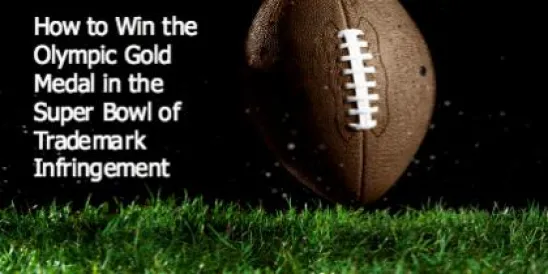Like any red-blooded American sports fan, the realization that both the Super Bowl and the Winter Olympics are only a few weeks away makes my thoughts turn to only one thing.
Trademark infringement.
Both of these iconic events have famous trademarks with extensive legal protection – and owners who take their rights very, very seriously.
The National Football League owns trademark rights, not only in its own name and logo, and in the names and logos of all 32 member teams, but also in the word SUPER BOWL and related logos. The league has been known to take a dim view of people using its registered marks without permission.
Not that people haven’t tried, of course. Applications to register all of the following have been filed in the Trademark Office, and all have failed:
-
Super Bowl of Motocross
-
Super Bowl of Poker
-
Sooper Bowl of Comedy
-
Super Bowl of Portable Restrooms (I swear I didn’t make that up).
There are others. And those are only the ones that someone applied to register. Imagine how many there must be that weren’tapplied for.
But the strength of the NFL’s rights pale in comparison with those of the people who run the Olympics, whose marks are protected not by the usual trademark laws but by their very own statutes, whose liability standards and potential penalties are especially stringent.
Here in the U.S., the Ted Stevens Olympic and Amateur Sports Act, 36 U.S.C. § 220501 et seq., gives the United States Olympic Committee exclusive control over the following symbols, terms, and phrases, among others:
-
The Olympic symbol (five interlocking rings representing the five continents)
-
“Olympic”
-
“Olympiad”
-
“Citius. Altius. Fortius.” (“Swifter. Higher. Stronger.”)
The statute permits the USOC to sue anyone who, without permission, uses the Olympic trademarks to market goods or services, or to promote a theatrical exhibition, athletic performance, or competition. A showing of likelihood of consumer confusion – usually the touchstone of trademark infringement – is not required. Other countries have their own statutes, which may differ in various respects.
Two years ago, the Summer Olympics in London produced a number of stories about small-town merchants who got nasty-grams from the sponsoring committee. Some of the situations – like the butcher who made a five-ring display out of sausage links – were mildly amusing. One shudders to think about what kinds of cease-and-desist letters they write in Russia…
The lesson is simple. If you’re thinking about using any Olympics- or Super Bowl-related words, slogans, or symbols to market your goods and services, think again. And talk to a trademark lawyer before proceeding.




 />i
/>i
